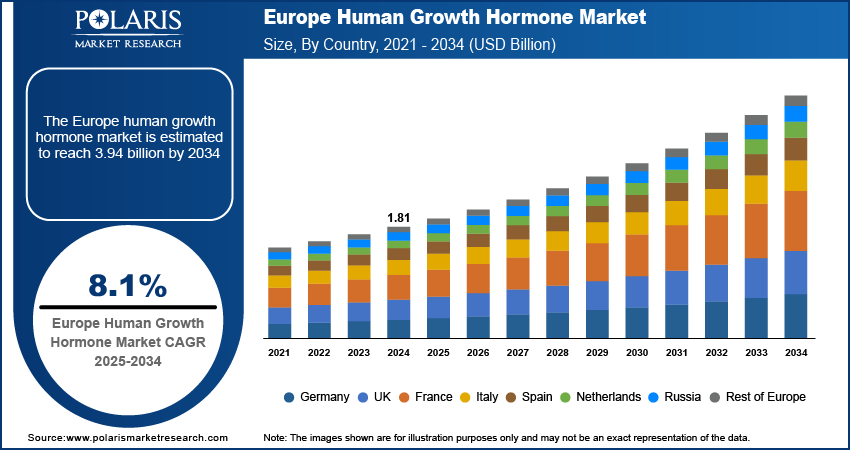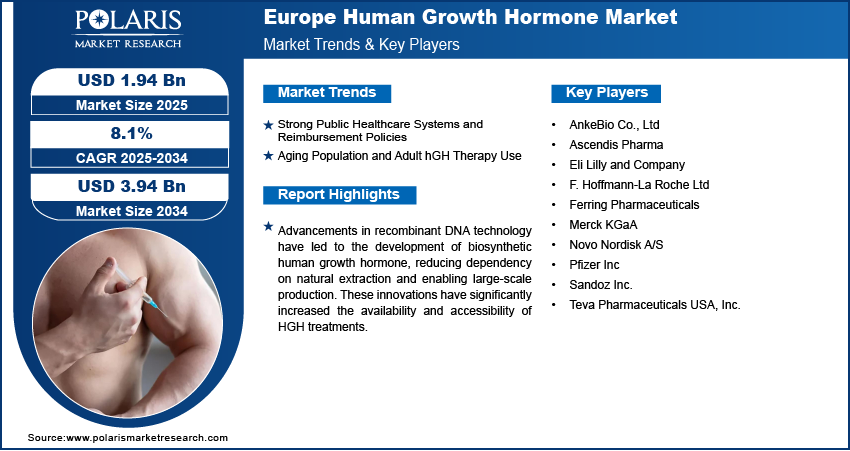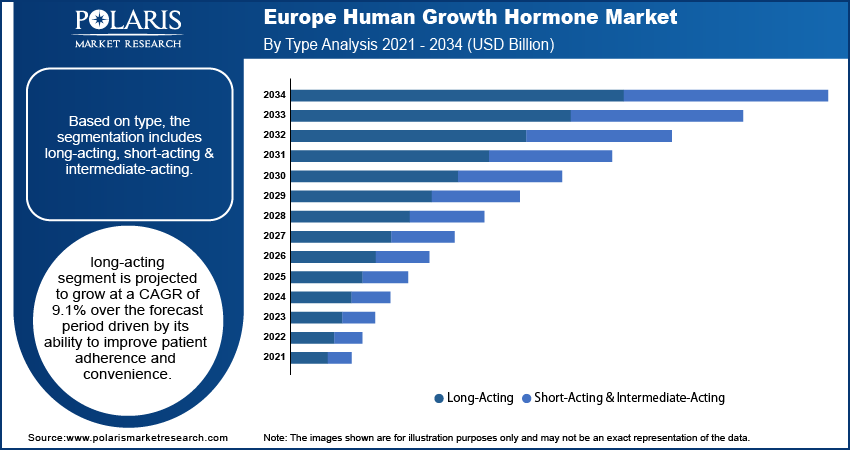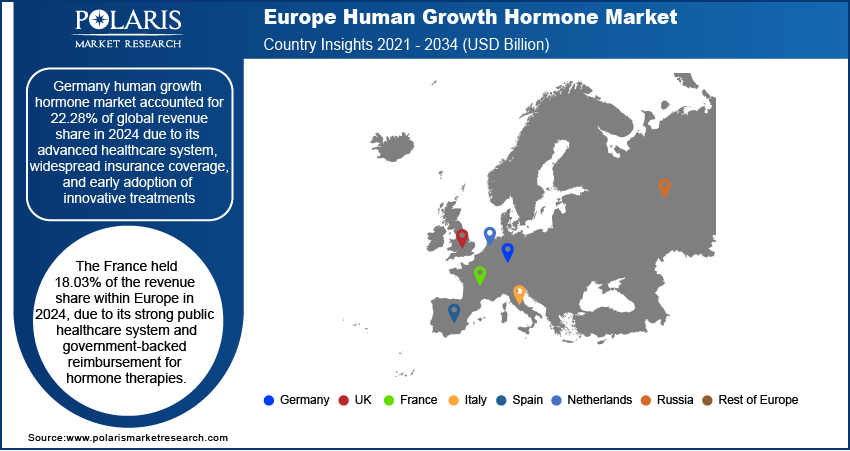
Europe Human Growth Hormone Market Size, Share, Trends, & Industry Analysis Report
By Type (Long-acting, Short-acting & Intermediate-acting), By Route of Administration, By Age, By Disease, By Distribution Channel, and By Country – Market Forecast, 2025–2034
- Published Date:Sep-2025
- Pages: 125
- Format: PDF
- Report ID: PM6430
- Base Year: 2024
- Historical Data: 2020-2023
Overview
The Europe human growth hormone market size was valued at USD 1.81 billion in 2024, growing at a CAGR of 8.1% from 2025–2034. Key factors driving demand is strong public healthcare systems and reimbursement policies, and aging population and adult hGH therapy use.
Key Insights
- The long-acting segment is expected to grow at a CAGR of 9.5% during the forecast period, driven by its enhanced convenience and improved patient adherence compared to daily injections.
- In 2024, the online pharmacies segment accounted for 14.90% of the revenue, reflecting the rapid shift toward digital healthcare in Europe, especially following the COVID-19 pandemic, which accelerated the adoption of online platforms for hGH distribution.
- Germany captured 22.28% of the global human growth hormone market revenue in 2024, supported by its advanced healthcare infrastructure, comprehensive insurance coverage, and early integration of innovative hGH therapies.
- France held an 18.03% share of the European market in 2024, owing to its strong public healthcare system and robust government reimbursement policies that promote access to hormone treatments.
Industry Dynamics
- Strong public healthcare systems and reimbursement policies are driving the demand for HGH.
- Aging Population and Adult hGH Therapy Use is driving the Europe Human Growth Hormone Market
- Advancements in recombinant DNA technology have led to the development of biosynthetic human growth hormone, reducing dependency on natural extraction and enabling large-scale production.
- High treatment costs and stringent regulatory requirements restrain the widespread adoption.
Market Statistics
- 2024 Market Size: USD 1.81 Billion
- 2034 Projected Market Size: USD 3.94 Billion
- CAGR (2025-2034): 8.1%
- Germany: Largest Market Share
AI Impact on the Industry
- AI enhances patient diagnosis by analyzing medical data to detect growth hormone deficiencies earlier and more accurately.
- AI-driven personalized treatment plans improve dosing accuracy and patient outcomes, optimizing HGH therapy for individual needs.
- AI-powered drug discovery and development accelerate the creation of new and improved HGH formulations, including long-acting therapies.
- AI-based monitoring tools help track patient adherence and response to HGH treatment in real time, enabling timely adjustments and better management.
- Predictive analytics using AI supports supply chain optimization, ensuring timely delivery and reducing costs in HGH distribution.
Human growth hormone is a protein hormone produced by the pituitary gland that stimulates growth, cell reproduction, and regeneration in humans. It plays a crucial role in childhood growth and continues to regulate body composition, muscle and bone growth, and metabolism in adults. Synthetic hGH is used to treat growth disorders in children and hormone deficiencies in adults.
Europe benefits from high medical awareness and advanced diagnostic infrastructure, leading to earlier detection of growth hormone deficiencies. Pediatricians and endocrinologists across the region are well-trained in identifying signs of hormone-related growth issues. Regular health screenings and school-based health programs in many countries contribute to early diagnosis, especially in children. Early detection allows for timely intervention, which is critical for effective outcomes with hGH therapy. This proactive approach increases the number of patients undergoing treatment, thereby boosting demand for human growth hormone products.

Europe has the presence of several leading pharmaceutical companies involved in human growth hormone research and production, such as Merck KGaA, Novo Nordisk (with strong European operations), and Sandoz. These companies invest heavily in R&D and regulatory compliance to bring innovative and affordable hGH products to market. Additionally, partnerships between local biotech firms and global players are helping to introduce advanced therapies and biosimilars. This strong industry presence fuels competition, improves access, and keeps the region at the forefront of innovation in hGH therapies, further driving expansion.
Drivers & Opportunities
Strong Public Healthcare Systems and Reimbursement Policies: Europe’s well-developed public healthcare systems drive the demand for human growth hormone-based products. Countries like Germany, France, and the UK provide universal healthcare access, which includes reimbursement for growth hormone therapies in many cases. This support makes treatments more affordable for patients and encourages early intervention. Insurance coverage for both branded and biosimilar hGH products ensures consistent demand. Additionally, national health authorities actively fund rare disease treatments, including hormone deficiencies, under special access programs. This supportive framework enables broader treatment access and drives steady demand growth across the region.
Aging Population and Adult hGH Therapy Use: Europe’s aging population is contributing to the growth of the hGH product demand. People may experience hormone deficiencies that can lead to reduced muscle mass, fatigue, and poor bone health as they age. hGH therapy is increasingly being explored for managing age-related hormone decline and associated health conditions. In countries like Italy, Germany, and Spain, growing interest in healthy aging and improved quality of life is pushing demand for adult hormone replacement therapies. This trend is expanding the target population beyond pediatrics, supporting long-term industry growth.

Segmental Insights
Type Analysis
Based on type, the segmentation includes long-acting, short-acting & intermediate-acting. Long-acting segment is projected to grow at a CAGR of 9.5 over the forecast period due to its convenience and better patient compliance. Traditional daily injections are being replaced by weekly or even monthly dosing options, which are especially attractive for children and working adults. European healthcare systems are actively adopting these therapies as they reduce the burden on both patients and caregivers. Regulatory approvals and growing clinical evidence supporting long-acting formulations further boost physician confidence. Companies like Ascendis Pharma and Novo Nordisk are expanding their presence in Europe with next-generation long-acting therapies, thereby driving the segment growth.
Route of Administration Analysis
Based on route of administration, the segmentation includes oral, and parenteral. Oral segment is expected to witness a significant share over the forecast period due to their non-invasive nature. Patients often prefer oral options over injections, especially children and elderly adults who require long-term treatment. European pharmaceutical companies and research institutes are investing in developing effective oral formulations that can maintain hormone stability and absorption. The potential for oral hGH is increasing as regulatory bodies like the EMA show openness to innovative delivery methods. If approved and adopted widely, oral administration could significantly improve treatment accessibility and adherence, thereby fueling the segment growth.
Age Analysis
In terms of age, the segmentation includes pediatric, and adult. The adult held 59.76% of revenue share in 2024 due to increasing awareness of adult growth hormone deficiency and related conditions such as fatigue, muscle loss, and poor bone density. The demand is growing for therapies that support healthier aging and improved quality of life with Europe’s aging population. European clinics are further increasingly offering hGH treatments for adults under controlled medical supervision. Moreover, growing interest in hormone therapy for recovery and wellness among middle-aged populations in countries like Germany and the UK is contributing to this segment’s growth.
Distribution Channel Analysis
In terms of distribution channel, the segmentation includes hospital pharmacies, retail pharmacies & drug stores, and online pharmacies. The online pharmacies segment held significant revenue share in 2024, holding 14.90% as online pharmacies are becoming a fast-growing channel for hGH distribution in Europe, especially after the COVID-19 pandemic boosted digital healthcare adoption. Patients appreciate the convenience, privacy, and ease of home delivery, particularly for chronic treatments like hGH therapy. European countries such as Germany and the Netherlands have well-regulated e-pharmacy systems that ensure safety and compliance. Increasing digital literacy and trust in e-health services are further supporting this trend. Additionally, insurance companies and health systems are starting to integrate online retail platforms for prescription drug fulfillment, thereby boosting the segment growth.

Country Analysis
Germany human growth hormone market accounted for 22.28% of global revenue share in 2024 due to its advanced healthcare system, widespread insurance coverage, and early adoption of innovative treatments. The country has a large base of endocrinologists and pediatric specialists, enabling accurate and timely diagnosis of growth hormone deficiencies. Germany further has a robust biotechnology sector and is a major hub for pharmaceutical research and development. The German industry continues to expand with strong reimbursement policies and growing interest in long-acting and biosimilar hGH therapies. Additionally, patient education and awareness initiatives further support high treatment adoption and long-term therapy compliance.
France Human Growth Hormone Market Insight
The France held 18.03% of the revenue share within Europe in 2024, due to its strong public healthcare system and government-backed reimbursement for hormone therapies. The country places a high priority on pediatric health, with national screening programs and routine check-ups that facilitate early diagnosis of growth disorders. French hospitals and clinics are equipped with the latest diagnostic tools and treatment protocols for hGH therapy. Furthermore, the country supports biosimilar adoption to lower healthcare costs without compromising quality. These policies, combined with a growing interest in long-acting therapies, are fueling the expansion of the hGH industry in France.
UK Human Growth Hormone Market
The market in UK is expected to register a CAGR of 9.1% during the forecast period driven by the National Health Service’s (NHS) increasing focus on personalized and evidence-based medicine. More patients are receiving timely and tailored treatments with rising awareness of both pediatric and adult growth hormone deficiency. The UK is further advancing in clinical research and trials for innovative hGH formulations, including long-acting and alternative delivery methods. Additionally, regulatory openness and digital healthcare platforms are enabling more efficient patient monitoring and follow-ups. These factors, along with NHS coverage and growing patient engagement, are pushing demand in both public and private sectors.
Netherlands Human Growth Hormone Market Overview
The demand in Netherlands is rising as the Netherlands is leading in digital health integration, particularly through online pharmacy channels. The Dutch healthcare system is highly organized and digitally connected, allowing seamless access to prescriptions and remote consultations. Patients benefit from fast diagnosis and convenient treatment delivery, especially for chronic conditions like hormone deficiencies. The country further has high acceptance of biosimilars, which are supported by government policies and physician trust. The Netherlands continues to adopt innovative therapies with a tech-savvy population and an efficient reimbursement system, including long-acting and oral hGH options, fueling the expansion.

Key Players & Competitive Analysis
The Europe industry is highly competitive, featuring a mix of established pharmaceutical giants and innovative biotech firms. Companies like Novo Nordisk A/S, Pfizer Inc., and Eli Lilly and Company lead with strong brand recognition, extensive distribution networks, and advanced long-acting formulations. Merck KGaA and F. Hoffmann-La Roche Ltd maintain a strong regional presence through continuous R&D and therapeutic innovation. Ascendis Pharma is gaining momentum with its novel long-acting therapies, particularly in pediatric endocrinology. Sandoz Inc. and Teva Pharmaceuticals are driving competition through the growing adoption of biosimilars, improving affordability across Europe. Ferring Pharmaceuticals and AnkeBio contribute to niche market segments and regional access. Regulatory support for biosimilars and high acceptance of innovative delivery methods such as weekly dosing create opportunities for differentiation. Companies are focusing on patient-centric solutions, strategic partnerships, and regional expansions to strengthen their market position across Europe.
Key Players
- AnkeBio Co., Ltd
- Ascendis Pharma
- Eli Lilly and Company
- F. Hoffmann-La Roche Ltd
- Ferring Pharmaceuticals
- Merck KGaA
- Novo Nordisk A/S
- Pfizer Inc
- Sandoz Inc.
- Teva Pharmaceuticals USA, Inc.
Industry Developments
July 2025, Ascendis Pharma A/S announced that the U.S. Food & Drug Administration (FDA) has approved SKYTROFA (lonapegsomatropin-tcgd; developed as TransCon hGH) for the replacement of endogenous growth hormone in adults with growth hormone deficiency (GHD), a rare disorder resulting from decreased or total loss of growth hormone production.
Europe Human Growth Hormone Market Segmentation
By Type Outlook (Revenue, USD Billion, 2021–2034)
- Long-acting
- Short-acting & Intermediate-acting
By Route of Administration Outlook (Revenue, USD Billion, 2021–2034)
- Oral
- Parenteral
- Intravenous
- Subcutaneous
- Intramuscular
By Age Outlook (Revenue, USD Billion, 2021–2034)
- Pediatric
- Adult
By Disease Outlook (Revenue, USD Billion, 2021–2034)
- Growth Hormone Deficiency
- Pediatric GHD
- Adult GHD
- Turner Syndrome
- Idiopathic Short Stature
- Prader-Willi Syndrome
- Others
By Distribution Channel Outlook (Revenue, USD Billion, 2021–2034)
- Hospital Pharmacies
- Retail Pharmacies & Drug Stores
- Online Pharmacies
By Country Outlook (Revenue, USD Billion, 2021–2034)
- Germany
- France
- UK
- Italy
- Spain
- Netherlands
- Russia
- Rest of Europe
Europe Human Growth Hormone Market Report Scope
|
Report Attributes |
Details |
|
Market Size in 2024 |
USD 1.81 Billion |
|
Market Size in 2025 |
USD 1.94 Billion |
|
Revenue Forecast by 2034 |
USD 3.94 Billion |
|
CAGR |
8.1% from 2025 to 2034 |
|
Base Year |
2024 |
|
Historical Data |
2021–2023 |
|
Forecast Period |
2025–2034 |
|
Quantitative Units |
Revenue in USD Billion and CAGR from 2025 to 2034 |
|
Report Coverage |
Revenue Forecast, Competitive Landscape, Growth Factors, and Industry Trends |
|
Segments Covered |
|
|
Country Scope |
|
|
Competitive Landscape |
|
|
Report Format |
|
|
Customization |
Report customization as per your requirements with respect to countries, Countrys, and segmentation. |
FAQ's
The market size was valued at USD 1.81 billion in 2024 and is projected to grow to USD 3.94 billion by 2034.
The market is projected to register a CAGR of 8.1% during the forecast period.
Germany dominated the market in 2024
A few of the key players in the market are AnkeBio Co., Ltd; Ascendis Pharma; Eli Lilly and Company; F. Hoffmann-La Roche Ltd; Ferring Pharmaceuticals; Merck KGaA; Novo Nordisk A/S; Pfizer Inc; Sandoz Inc.; Teva Pharmaceuticals USA, Inc.
The long-acting segment dominated the market revenue share in 2024.
The online pharmacy segment is projected to witness the fastest growth during the forecast period
